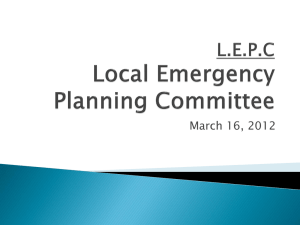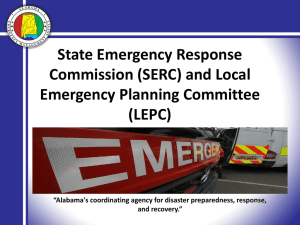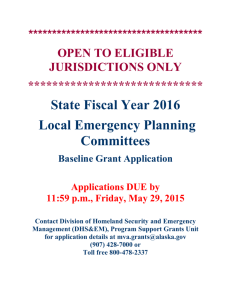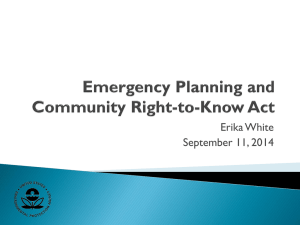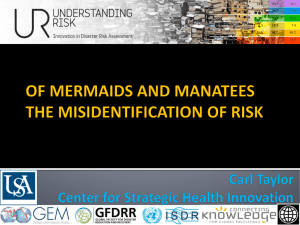This package includes all information and procedures necessary for
advertisement
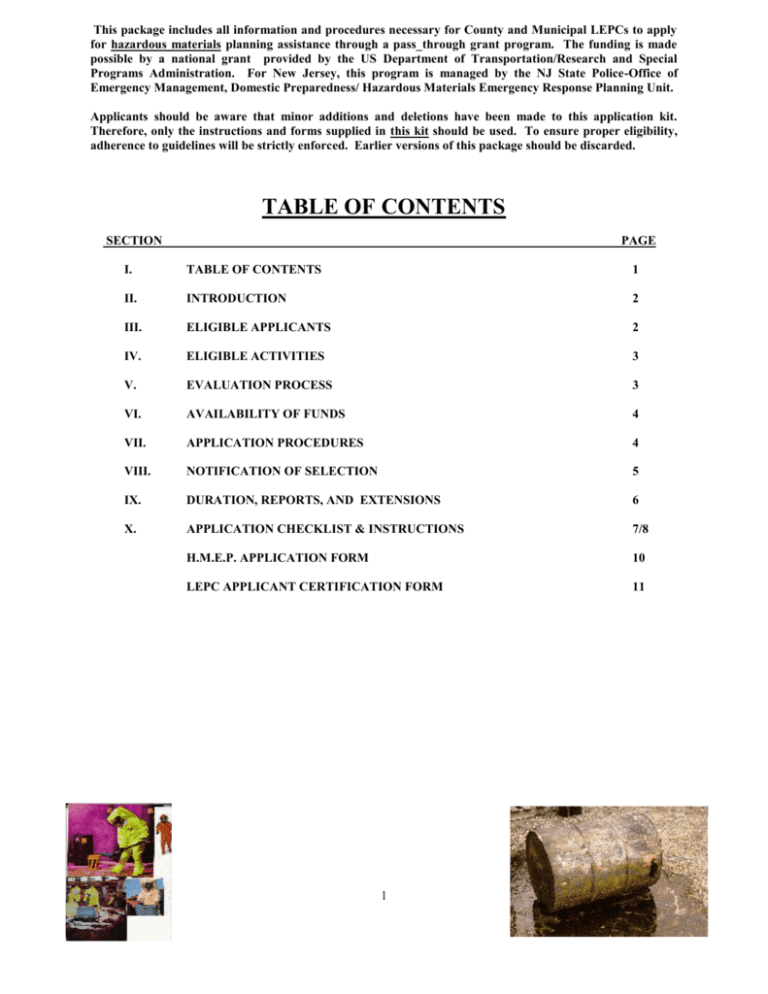
This package includes all information and procedures necessary for County and Municipal LEPCs to apply for hazardous materials planning assistance through a pass_through grant program. The funding is made possible by a national grant provided by the US Department of Transportation/Research and Special Programs Administration. For New Jersey, this program is managed by the NJ State Police-Office of Emergency Management, Domestic Preparedness/ Hazardous Materials Emergency Response Planning Unit. Applicants should be aware that minor additions and deletions have been made to this application kit. Therefore, only the instructions and forms supplied in this kit should be used. To ensure proper eligibility, adherence to guidelines will be strictly enforced. Earlier versions of this package should be discarded. TABLE OF CONTENTS SECTION PAGE I. TABLE OF CONTENTS 1 II. INTRODUCTION 2 III. ELIGIBLE APPLICANTS 2 IV. ELIGIBLE ACTIVITIES 3 V. EVALUATION PROCESS 3 VI. AVAILABILITY OF FUNDS 4 VII. APPLICATION PROCEDURES 4 VIII. NOTIFICATION OF SELECTION 5 IX. DURATION, REPORTS, AND EXTENSIONS 6 X. APPLICATION CHECKLIST & INSTRUCTIONS 7/8 H.M.E.P. APPLICATION FORM 10 LEPC APPLICANT CERTIFICATION FORM 11 1 II. INTRODUCTION On September 9, 1992, the United States Department of Transportation, Research and Special Programs Administration released its Final Rule, 49_CFR_Part 110. This rule provided a reimbursable grant to every state, Indian tribe and U.S. territory, to assist in hazardous materials response planning and training related activities. This final rule, originally outlined in the Hazardous Materials Transportation Act (HMTA), was initially named the Hazardous Materials Transportation Uniform Safety Act (HMTUSA). The name and program have since been amended to the Hazardous Materials Emergency Preparedness (HMEP) Program. Under this format, a single agency for each state is designated to be the coordinator of these grant funds. For New Jersey, the HMEP grant coordinator is the NJ State Police-Office of Emergency Management, Domestic Preparedness Hazardous Materials Emergency Response Planning Unit (NJSP-OEM/DP/HMERP). The grant given to the state is broken down into two separate parts, planning and training. Under the planning portion, the recipient is required to “pass-through” 75% of the funding directly to the Local Emergency Planning Committees (LEPCs) to assist them in their Hazardous Materials planning related activities. This is accomplished in two ways: A. Specialized support by state staff to county/municipal LEPCs and responders for hazardous materials emergency planning related issues. B. Administering a “Pass_Through” grants program to LEPCs for the purpose of conducting specific projects related to their respective hazardous materials emergency planning needs. Item B above is the subject of this application kit. LEPCs can apply directly to the NJOEM for the funding of projects to be conducted by their jurisdiction. Limits will be placed on types of activities and on levels of funding. Grants will be evaluated on how well project proposals match the criteria established by the USDOT in 49_CFR Part 110 and as discussed in Section IV of this package. Funding will be made on a reimbursement basis only. In other words, LEPCs will be reimbursed for expended monies after the project has been completed, actual costs verified and the NJSP-OEM DP/HMERP Unit has the final report in hand! NO MATCHING FUNDS WILL BE REQUIRED OF APPLICANTS. The primary objective of these grants is to improve the implementation of LEPC/hazmat emergency planning efforts. The possibility of hazardous materials accidents/incidents varies greatly in New Jersey. Some areas, due to their geographic location, are at risk from air, rail, roadway, and waterway incidents. Other areas may be at relatively low risk with regard to actual hazmat facilities, but have compounding factors such as heavily traveled roadways or transportation dependent populations (hospitals, schools, and nursing homes). These could present significant problems in the event that they, or a neighboring community, experience a hazmat incident. For these reasons, the NJOEM has chosen to make a portion of the State's HMEP grant available directly to LEPCs for the purpose of developing projects to address the unique circumstances of haz mat incidents at the local level. III. ELIGIBLE APPLICANTS A. The HMEP Pass_Through Grant Program is open only to the 21 counties and 566 municipal LEPCs in New Jersey. No other governmental or non_governmental entities may apply. While work may be done under one or more agencies of county or municipal government, application must be made by the jurisdiction’s LEPC. Multiple applications from a single county or from a single municipality will be denied. To ensure that project proposals are coordinated by an actual LEPC, each application will require signatures by all participating LEPC agencies. All applications must be signed by the Emergency Management Coordinator. B. LEPCs must also have a current state approved Emergency Operations Plan (EOP) in order to be eligible to apply. A copy of the letter of EOP approval from the NJOEM is required. The NJOEM will check the status of the applicant’s EOP upon receipt of a project proposal to ensure that the EOP has not lapsed as per NJSA App. A:9_30 et. seq. 2 C. An applicant must also provide proof that it is a viable LEPC, holding membership from all appropriate agencies according to the requirements of SARA Title_III. A copy of the current ledger of LEPC membership will suffice. This membership ledger shall include the signature of the elected official who has appointed the LEPC chairperson (i.e., freeholder or mayor). IV. ELIGIBLE ACTIVITIES Only certain activities are allowable under the HMEP Pass_Through Grant Program. The NJOEM will use the same eligibility criteria that the U.S.D.O.T. uses for state level programs. Work can be done by the county or municipality itself, or by outside contractors. Projects must involve new work (not simply a reimbursement for activities accomplished under existing planning programs). Since there will be other dedicated funding for Weapons of Mass Destruction (WMD) training, planning and exercising, HMEP funding cannot be used for WMD activities. Examples of some eligible projects are as follows: A. A hazmat analysis for a particular geographic region with regard to the impact on the community should an accident/incident occur. B. Improvement/enhancement of the municipal or county Emergency Operations Plan (EOP) with regard to specific hazmat issues. C. Exercises that test the jurisdiction's emergency response capabilities with regard to the EOP/HazMat Annex. Grantees wishing to conduct exercises must also comply with State Directive 74, Approval of Emergency Management Exercise, and obtain the proper forms from the NJSP-OEM prior to conducting any portion of the exercise (FEMA form 95-16). This will ensure that they receive proper recognition and credit, both state and federal. D. Assessments to determine flow patterns of hazardous materials within a jurisdiction or between jurisdictions. Information and instructional guide books on how to conduct these Commodity Flow Studies are available at the NJSP-OEM. E. Development of Standard Operating Procedures (S.O.P.s) for hazardous materials emergency response personnel and all potential first responders within a specific jurisdiction. While applicants may utilize the above listed activities as guidelines, other projects will be considered, as long as they are related to hazardous materials emergency response planning. In a given year, two or more LEPCs in close geographic proximity may unknowingly propose similar projects under this grant program. In such cases, the NJOEM will notify each LEPC respectively of this overlap, requesting that they meet on their own to modify or unify their proposals. A short description of prior projects funded since the inception of this program can be furnished upon request . Complete copies of funded, well executed applications are also available at State Police Headquarters-Office of Emergency Management/ Domestic Preparedness /Hazardous Materials Emergency Response Planning Unit in West Trenton, (732)721-4040 V. EVALUATION PROCESS As in the past, the NJOEM expects that there will be more project applications than can be realistically funded. Since funding under this grant program is limited, competition is an unavoidable factor. In order to ensure an equal and impartial awarding system, the NJSP-OEM DP/ HMERP Unit will review all applications individually, utilizing a standardized criteria. Once an application is deemed to meet the minimum requirements set forth below, each will be rated on its creativity and usefulness as compared to all other projects submitted. The decision to choose a project for funding will be based on the following considerations: A. Applications must be filled out completely. All necessary forms must be included. B. Project proposals must meet the intent of the Hazardous Materials Emergency Preparedness Program. Projects must be related to hazardous materials planning. 3 C. Projects should be useful to other jurisdictions. No work will be considered proprietary. All data and accomplishments derived from this grant program will be made available to the NJOEM for distribution to any LEPC interested in acquiring or utilizing them. Therefore, projects that involve work that will benefit numerous LEPCs will rate highest for consideration. D. No equipment purchases! Projects that solely involve the purchase of equipment are prohibited. This is a planning grant program and as such, equipment which would be used for training or response is contrary to the intent of this program. While it is possible that minor equipment purchases may be necessary to effectively carry out an intended project, this type of expenditure should be kept to a minimum and may directly affect an applicant’s rating of eligibility. * Funding of projects to applicants who received awards under this program in prior years is discouraged. It is the intent of the NJSP-OEM to fund the greatest number of LEPCs possible during the duration of the entire project period. This is not to say that applicants who received funding in the past should not apply, but in the interest of fairness, new applicants will receive first consideration. VI. AVAILABILITY OF FUNDS For the Tenth budget period (2002-2003), the NJOEM has made a total of $125,530.00 available in HMEP Pass_Through Grant funding. A maximum award cap of $8,000 per application has been established per LEPC. Applicants may develop project proposals which exceed $8,000 in cost, but they will be responsible for all costs beyond the $8,000 maximum allowable cap. Additionally, applicants may also be selected to receive “partial funding” to complete their project. If an applicant chooses to accept the reduced award, they must either modify their project to accommodate the reduced funding, or identify the source of the additional funding to complete the intended project in its’ entirety. APPLICANTS WILL NOT BE REQUIRED TO PUT UP MATCHING FUNDS UNDER THIS PROGRAM. This is a reimbursement grant program. Upon satisfactory completion of the project by the LEPC and submission of the final report, the NJOEM will reimburse the county or municipality for those expenditures which were deemed eligible by the NJOEM in the original application kit submitted by the LEPC. No funds will be paid to LEPCs in advance of the anticipated completion of work! VII. APPLICATION PROCEDURES ALL APPLICATIONS MUST INCLUDE THE FOLLOWING INFORMATION: 1. A cover letter, signed by the elected official of the jurisdiction. 2. A HMEP Pass_Through Grant Project Application. (Included in this kit with directions, pps.8 & 9). All blocks on the form must be completed for the application to be reviewed. Incomplete or improperly prepared applications will be rejected. The application submitted must be the signed original. 3. An LEPC Applicant Certification form. (Page 12) The purpose of this form is to establish a coordinated, single point of contact for the applicant jurisdiction. Only one project per LEPC will be accepted for consideration each year. 4. Proof of approval of the LEPC’s Emergency Operation Plan. A copy of the letter of approval from the NJOEM will suffice for this purpose. Note that the LEPC must keep its EOP current throughout the grant period. 4 5. Proof of a viable LEPC. A copy of the jurisdiction's LEPC ledger will qualify, however it will be subject to verification by NJOEM Emergency Management Bureau personnel. Note that the ledger must also include the signature of the elected official for the jurisdiction. 6. Project Narrative. Project narratives should be limited to two typed pages and should clearly identify and discuss each of the following items: a. Description - Details of the jurisdiction, LEPC, and the hazardous material(s) presenting the risk. b. Project Proposal Idea - What the project is about and why it should be funded. c. Method of Implementation - Explain how the work will be done. Also discuss if the work will be accomplished in_house by the LEPC staff itself, by outside contractors, or by a combination of both. d. Itemized Funding Breakdown If the project exceeds the Tenth budget period cap of $8,000.00, then the additional amount necessary to conduct the program must be provided by the jurisdiction itself. All financial expenditures should be identified and substantiated. Totals should be entered in Section 5 of the Project Application form. e. Time Line of Project Activities - Identify attainable goals and realistic dates. specific! f. Monitoring Methods - Explanation of how the project will be evaluated and/or monitored by the grant manager to ensure its proper implementation and effectiveness. g. Other Documentation - Any additional materials to support the applicant's project proposal. While supporting documentation is optional, applicants should include this information if it will further explain the urgency and applicability of the project as it relates to the intent of the Pass_Through Grant Program. Be Applications under this program must be postmarked no later than March 3, 2003. No exceptions or extensions will be made for the filing of project applications. Applications postmarked after this date will be rejected. ALL project applications and all supporting documentation should be forwarded to the NJSPOEM at the following address: HMEP PASS_THROUGH GRANT PROGRAM NEW JERSEY STATE POLICE OFFICE OF EMERGENCY MANAGEMENT BOX 7068 RIVER ROAD WEST TRENTON, NJ 08628_0068 ATTN.: SGT. M. MCINTYRE FOR QUESTIONS REGARDING THE APPLICATION PROCESS CALL (732)721-4040 VIII. NOTIFICATION OF SELECTION The decision to fund projects will be made solely by the NJOEM/DP/HMERP Unit. All applications must be received by the date stipulated above--NO EXCEPTIONS!! All applicants will receive written notification as to the status of their grant application. The decision to fund projects will be made no later than April 18, 2003 and will be final. No appeals will be accepted. If an applicant is selected and notified of an award approval, but then decides to voluntarily withdraw from the pass_through grant process, a written notification must be made by the grantee to the NJOEM as soon as possible, but no later than 14 days after receipt of award notification. In the event of a grantee withdrawal, the next highest ranking LEPC application not initially selected shall be offered the grant funding. 5 IX. PROJECT DURATION, REPORTS, AND EXTENSIONS Once notification of an HMEP Pass-Through Grant award is sent to the applicant, it is assumed that the project will be carried out in full, as originally outlined in the initial application. Any changes in the intended scope of work, without expressed written permission of the NJOEM, is strictly forbidden. Any work for which reimbursement is sought, but which was not included in the originally approved LEPC's project application will not be reimbursed. All work must be completed by OCTOBER 31, 2003. At any time during the grant period, a member of the NJOEM may visit an LEPC to assess the progress of their project. A. Time Frame: Applicants will be required to adhere to the reporting procedures specified below. All required documentation must be provided in order to receive reimbursement for approved expenditures. Time extensions may be applied for in writing by grant recipients, and will be evaluated on a case by case basis. B. Reports: Grant recipients will be required to file the two following reports during the grant period: 1. 2. Mid-Progress Report: A brief progress report on or before July 18, 2003 to include: a. A discussion of the work completed as of the above listed date, which should also coincide with the grant recipients original application time line. b. An explanation of why any work has not yet been accomplished (as per the original application). c. A discussion of the work still to be undertaken, and if progress is moving according to schedule. d. A listing of expenditures incurred as of this date. It is not necessary for grant recipients to forward paid invoices, bills or receipts to the NJOEM with this report, but a summary of accounting expenditures is required. Final Report: A Final Report will be required no later than OCTOBER 31, 2003, and will include all information and pertinent data relevant to the completed project. A sample of all deliverables and/or products should be included (or made available for review by the NJOEM) if applicable. The Final Report should, at a minimum, include the following items: a. A discussion of the completed project and all resultant benefits. Describe the manner in which the project will be used by the jurisdiction in any future hazmat planning activities. b. A listing of all expenditures incurred. LEPCs should distinguish between in_house work and contracted work. Work that is accomplished by county or municipal personnel should reflect all time, activity, salary, and fringe rates for the participating individual(s). For contracted work, each expenditure should be itemized, explained, and accompanied by a copy of a paid invoice or receipt. It is critical that these expenditures are well documented since the NJOEM must have proof that the LEPC actually incurred such expenses before the reimbursement can take place. c. Time extensions may be requested, and will be evaluated on a case by case basis. Requests for an extension must be received in writing by the NJOEM no later than SEPTEMBER 29, 2003. Approval for an extension will be based on the applicant’s explanation of the reason that the project cannot be completed by the designated completion date. 6 X. APPLICATION CHECKLIST & INSTRUCTIONS To assist LEPCs with preparing their applications, the following documents are required to be submitted under New Jersey's HMEP Pass_Through Grant Program. These forms should be submitted under cover letter signed by the elected official of the jurisdiction. Please assemble these documents in the order listed. 1. Cover letter 2. Project Application form 3. LEPC Applicant Certification form 4. Current EOP approval letter 5. LEPC Membership Ledger 6. Project Narrative 7. Other supporting documentation (optional) INSTRUCTIONS FOR PREPARING HMEP PASS_THROUGH GRANT PROGRAM PROJECT APPLICATION FORM The HMEP Project Application Form on the opposite side of this page must be completed in full and submitted along with the other required signatures and documentation requested in this application kit. Please ensure that the forms submitted are the signed and dated original. Please type all information and sign in ink at the appropriate line. 1. LEPC NAME AND ADDRESS The incorporated name of the county or municipality, and the mailing address. This should be the LEPC address where all correspondence for this project will be sent. 2. CONTACT PERSON AND TELEPHONE The project coordinator for the LEPC. It is preferred that the Emergency Management Coordinator remain the contact for the project, however a participating agency head other than the Emergency Management Coordinator may be designated as long as the Emergency Management Coordinator acknowledges this by signing off in block number seven (#7). Please provide the daytime telephone number for the project coordinator. 3. JURISDICTION'S EMPLOYER IDENTIFICATION NUMBER The nine digit Employer Identification Number (EIN) for the county or municipality. 4. TYPE OF LOCAL EMERGENCY PLANNING COMMITTEE Indicate whether the project application is for a county or municipal LEPC. 5. FUNDING BREAKDOWN List the amount of funding requested from the State (up to $8,000), any amount to be contributed by the jurisdiction itself or any other source, and the total of all amounts. 6. PRIOR APPLICANT/PRIOR AWARDEE Has the applicant jurisdiction applied before and if so, did they receive an award? 7. BRIEF DESCRIPTION OF PROJECT A summary of the objective or basic idea of the project. Limit to five sentences or less. 8. NAME OF LEPC CHAIRPERSON 7 Type the name of the LEPC chairperson (the jurisdiction's Emergency Management Coordinator), and daytime telephone number. Include the signature of this person in ink, and the date of signature. ANY QUESTIONS REGARDING THIS GRANT APPLICATION SHOULD BE FORWARDED TO: SGT. MICHAEL G. MCINTYRE NJSP/OEM BOX 7068-RIVER RD WEST TRENTON, NJ 08628-0068 (732) 732-4040 8 THIS PAGE WAS INTENTIONALLY LEFT BLANK 9 H.M.E.P. PASS-THROUGH GRANT PROJECT APPLICATION FORM (Must be filled out completely and legibly, print or type) 1. LEPC NAME & ADDRESS 2. CONTACT PERSON & TELEPHONE 3. JURISDICTION’S EMPLOYER IDENTIFICATION NUMBER 4. TYPE OF LOCAL EMERGENCY PLANNING COMMITTEE – COUNTY 5. FUNDING BREAKDOWN (TO CONDUCT PROJECT) STATE $______________________ LEPC $______________________ OTHER $______________________ TOTAL $______________________ MUNICIPAL 6. PRIOR APPLICANT/AWARDEE HAS THE APPLICANT APPLIED BEFORE HAS THE APPLICANT RECEIVED AN HMEP PASS-THRU GRANT IN THE PAST YES YES NO NO Enter amount you are applying for (up to $8,000.00) in state column. Enter additional costs (to be paid by LEPC or Other) in appropriate column. 7. BRIEF DESCRIPTION OF PROJECT (FOUR SENTENCES OR LESS) _______________________________________________________________________________________________________________ _______________________________________________________________________________________________________________ _______________________________________________________________________________________________________________ _______________________________________________________________________________________________________________ 8. NAME OF LEPC CHAIRPERSON (PLEASE TYPE) TELEPHONE NUMBER ____________________________________________ (_____)_________________________________ ____________________________________________ SIGNATURE _______________________________________ DATE SIGNED FOR NJ-OEM/DP/HMERP USE ONLY COMMENTS ___COVER LETTER ____EOP APPROVAL ____LEPC LEDGER ____LEPC CERTIFICATION ____TIME LINE ____EXPENSES ____MEAN SCORE 10 LEPC APPLICANT CERTIFICATION FORM I, _________________________________, do hereby certify that only one project application (Emergency Management Coordinator) has been prepared for the HMEP Grant Program by the _________________________________. (Name of Jurisdiction) This project application has been coordinated and submitted with prior knowledge of all agencies of this jurisdiction's Local Emergency Planning Committee. _________________________________________________________________ (Name of LEPC Chairperson) _________________________________________________________________ Signature of Emergency Management Coordinator or LEPC Chairperson ___________________ Date Acknowledgment of project coordination with the LEPC: Print the names of individuals and agencies from the five listed major representative groups for the jurisdiction's LEPC. Include signatures and dates for each. 1. Elected Official: ____________________________________________________________________________________________ (Name of Individual) (Municipality) __________________________________________________________________________ (Signature of Elected Official) Date 2. Response Rep.: ___________________________________________________________________________ (Name of Individual) (Agency) ___________________________________________________________________________ (Signature of Individual) 3. Media Rep.: Date ___________________________________________________________________________ (Name of Individual) (Agency) ___________________________________________________________________________ (Signature of Individual) Date 4. Volunteer Rep.: ___________________________________________________________________________ (Name of Individual) (Agency) ______________________________________________________________________________________________ (Signature of Individual) Date 5. Facility Rep.: ___________________________________________________________________________ (Name of Individual) (Agency) ______________________________________________________________________________________________ (Signature of Individual) (Date) 11
